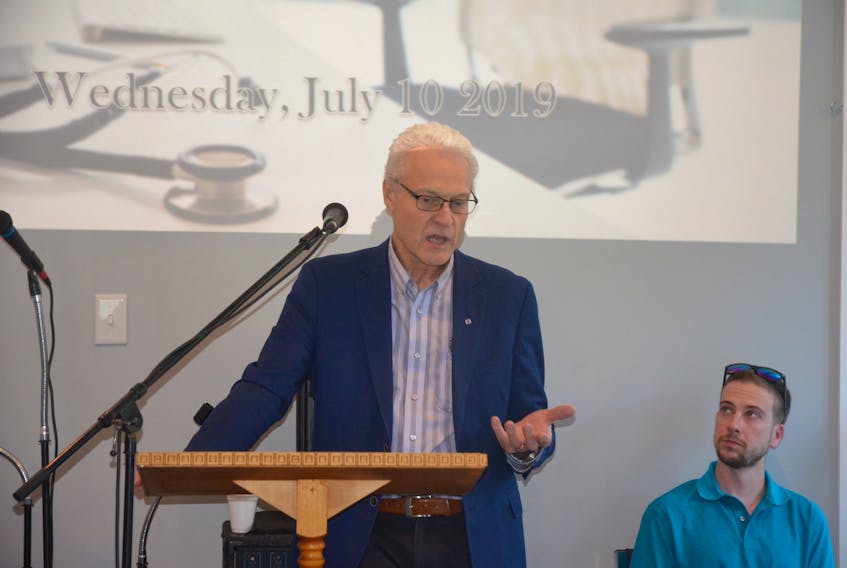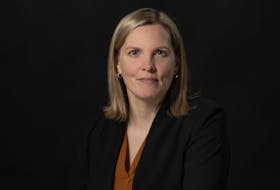MILLVILLE, N.S. — The members of Make Emergency Great Again (MEGA) are certain that Nova Scotia is in the midst of a health-care crisis.
Despite their name sounding close to another acronym derived from south of the border, their area of concern has nothing to do with U.S. politics.
Their focus is on the lack of support frontline health-care workers have been receiving from the provincial government.
Representatives from MEGA spoke to guests at the Millville Community Hall July 10 to talk about why they feel the province is in the midst of a health-care crisis.
The event, a town-hall-style meeting, entailed a serious conversation about what is wrong with health care in Nova Scotia – and what can be done to rectify it.
“There’s no point in squabbling over words to describe the health-care crisis we’re in,” said Dr. Rob Miller, founding member of MEGA and an emergency room physician who works, and has worked, at several hospitals in the Valley region. “Where do the politicians and bureaucrats get off denying that this crisis exists? Where did they go to medical school? They didn’t.”

Miller contended that emergency rooms in Nova Scotian hospitals are overcrowded, with beds being occupied to capacity and ambulatory services being held up, leading to massive burnout across the field.
This burnout, Miller noted, leads to job attrition – like the two physicians who walked away from his hospital, and countless nurses on a regular basis pushed far beyond reasonable expectations.
On the patient end, Miller lamented the rise of “hallway medicine.”
Things will only get worse if the public doesn’t put pressure on the Department of Health and Wellness to make changes to improve the situation in primary care, Miller said.

MEGA stresses the need for advocacy, and for the voices of frontline health-care workers to be heard.
Dr. Rebecca Brewer described a situation when a serious issue arose, and the overall system was to blame – not frontline workers.
“They’re doing the best they can with what they were given to work with, and it’s up to policy makers to fix it,” Brewer said. “We’re all in this together. When you’re suffering through this health-care crisis we’re all suffering in it together.
“It’s good to see so many of you people caring about this as well. We want to make sure everyone’s voices are heard, and something comes of all this.”
Dr. Keith MacCormick described a vital piece of the puzzle to fixing health care in Nova Scotia, compared it to fixing a leaking roof.
“It sounded really good in 2015, when one health authority was formed,” MacCormick said. “It’s a small population in Nova Scotia, and not a big geographic base and surely a unified system would work better.”
MacCormick said that was not the case, noting that once the single health authority was implemented, frontline workers such as himself “started feeling the drops.”
“At first, you run around with buckets trying to catch the drops, but little by little you start looking up and realize we shouldn’t be complaining about the drywall with a leak,” MacCormick said. “It’s something up top. Something wrong with the whole system.
We need someone who can point out the flaws and errors in the way the governance is set up.”
Dr. Bob Mullan noted that he believes a solution to the health-care situation is about bringing the right providers and patients together at the right time and creating a reasonable funding model for health-care professionals.
“We need to introduce some sanity in the way we deliver care.”
Mullan suggested putting someone in charge of record management, referencing the extensive levels of burnout and overwork doctors experience and managing complex computerized patient records.
“We can do more,” Mullan said, “but we need to make some administrative changes.”
BY THE NUMBERS
Paula Minnikin, a specialist in corporate governance who has crunched numbers from the Canadian Institute for Health Information, disclosed one of the most damning statistics of all relating to Nova Scotia’s health-care situation.
“We are number one in Canada, in terms of the cost of health administration as a portion of our health-care costs,” Minnikin said. “Our administration and management costs are 35 per cent more here than anywhere else in the country.”
Minnikin alluded to other numbers, including the fact that two to three times the number of doctors joining the health-care system are retiring; doctors’ salaries being 30 per cent lower than any other place in Canada – and the 51 hospital closures there were this past Canada Day.
Make Emergency Great Again is a grassroots advocacy movement intended to raise public awareness of the unacceptably high levels of emergency room overcrowding in Nova Scotia.
According to founding member Dr. Rob Miller, MEGA is meant to spur the creation of long-term care beds and address a shortage of family doctors – particularly in rural areas.
GOVERNMENT RESPONSE
The Nova Scotia Department of Health and Wellness disputes the numbers Minnikin put forward at the town hall meeting.
Heather Fairbairn, a spokesperson for the Department of Health and Wellness, specifically addressed some of the numbers Minnikin referenced at the meeting, saying that the claim administration and management costs in Nova Scotia being 35 per cent higher than anywhere else in Canada, “is incorrect.”
“We are in line with other jurisdictions, according to the Canadian Institute of Health Information,” Fairbairn wrote in an email to Kings County News.
“Administrative expenses in Nova Scotia are about 4.8 per cent higher than the Canadian average of 4.5 per cent.”
Fairbairn also spoke on the matter of doctor attrition in the province, noting there is not requirement for doctors who are retiring or leaving to report so to the NSHA.
“Some do so voluntarily, but we do not have a full picture on the number of physicians leaving practice in Nova scotia,” Fairbairn wrote. “We do know that physicians are in very high demand and Nova Scotia is competing with countries around the world to attract them.”
She cited recruitment and retention as being a priority for the province, NSHA and College of Physicians and Surgeons.
On the matter of salaries, Fairbairn also disputed the 30 per cent figure Minnikin spoke of.
“Physician compensation is complex with three basic payment models and a range of incentive and premium aments that impact the overall level of pay,” Fairbairn wrote. “All rates are negotiated with Doctors Nova Scotia (DNS)”
Compensation levels are based on productivity levels and fees for services, Fairbairn wrote, adding that the province has worked with Doctors Nova Scotia to develop a $39.6 million package for family doctors.









